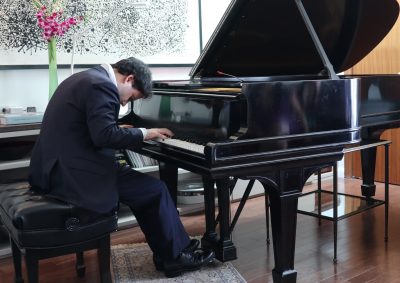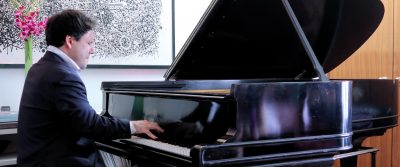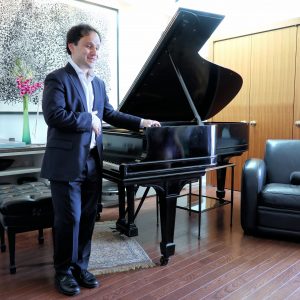Pianist Ivan Gusev was born in Kazakhstan. He has two degrees from the Moscow Conservatory, an institution that produces pianists of the pedigree of Emil Gilels, Sviatoslav Richter etc.
So when I received an invitation to attend Ivan’s recital in a private home, I was thrilled. A Russian School pianist playing Rachmaninov! I couldn’t wait to hear him play.
The program opened with some light Mozart. Thereafter the recital grew progressively more intense, closing with fireworks in the form of a virtuoso Rachmaninov prelude.
Mozart: Sonata No. 12 in F Major K322
Mozart’s Allegro opens friskily, bouncing back and forth to minor key arpeggios, with glimpses of Beethoven-like drama. Gusev glided through this with confidence.
The gentle Adagio over a clockwork (Alberti) bass introduced us to Gusev’s signature head-back eyes-closed happy face. Mozart can have that effect on people!
The closing Allegro Assai was a little more rambunctuous, giving Gusev room to show some pianistic flair.
Schubert: Four Impromptus, Op. 90
Schubert’s weightier warmth allowed Gusev room to be more expressive. Here, as throughout the recital, I was struck by how focused he was and how rich his sound. The deep low end of the house Steinway helped.
Grieg: Six Poetic Tone Pictures, Op. 3
These short Grieg works are, as Gusev noted, very romantic. He played them with passion, but to me the works themselves were incoherent.
Here and there we heard echoes of a folk dance or a lullaby. At other times, Grieg sounded like Chopin having a bad practice day.
Rachmaninov: Three Etudes-Tableaux
Of the selected Etudes-Tableaux, I most enjoyed the first (A minor Op. 39 No. 2 “The Sea and the Seagulls”). Gusev’s resonant harmonics glowed. His right hand crossed his left in a slow, mesmerizing arc for the bass motif. Indeed his presentation of Rachmaninov’s cacophonous layers was so riveting that I momentarily forgot to breathe.
The E-flat minor had more of a movie-theme feel. It was expansive, pounding and appropriately slushy. After the opening drama and subsequent clatter the theme returned, crumbling into dissonance. Again Gusev projected emotion with controlled intensity.
Gusev gave an expansive, weighty performance of the C minor Op. 33 no. 3 (compare with Yuja Wang, Berlin 2018) . When the big theme came forward over a dominant low end, the result was quite different from what you hear in other performances. I loved it.
 Rachmaninov: Prelude in B-Flat Major, Op. 23 No. 2
Rachmaninov: Prelude in B-Flat Major, Op. 23 No. 2
From the resounding opening through dazzling two-handed descents to glittering right hand swirls, Gusev threw everything he had into this showpiece. He appeared enraptured, playing with such vigor that the piano shook.
This was a remarkable performance, larger than the pianist and the setting. While one could nitpick here and there, I felt that this was Rachmaninov as he should be played. As the final chord faded, someone shouted “yeah!”. The pianist stood up with a huge grin. He knew that he had nailed it.
Encores: Chopin Waltzes
The first encore was Chopin’s Waltz in A minor Op. Post. This is a forgiving work that pianists can easily put their personal stamp on. Gusev’s Waltz was adventurous, with liberal rubato and fast upper register runs. Finally, Gusev played Chopin’s Minute Waltz Op. 64 No. 1.
Russian soul?
Ivan Gusev’s performance style is low-key. Sometimes he leans into the piano or tilts his head back. At other times, he raises an arm to punctuate a phrase. His facial expressions are not theatrical. They are those of a pianist immersed in creating an authentic musical experience.
With the exception of Grieg (for which I hold the composer responsible), Gusev’s entire recital was enjoyable. But his Rachmaninov outshone everything else. It was simply stunning.
Was this because Gusev is, as he explained to me, culturally 75% Russian? Or is it more a product of his Moscow Conservatory education? From either perspective, I miss only the vodka and zakuski.


You must be logged in to post a comment.